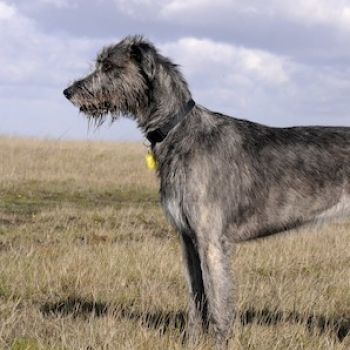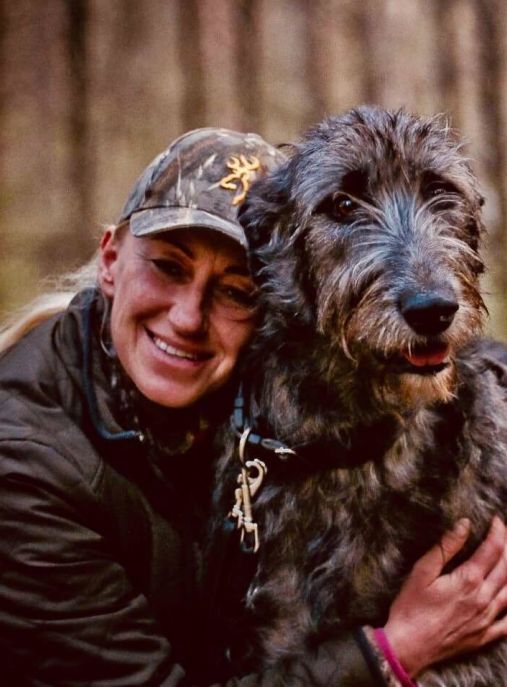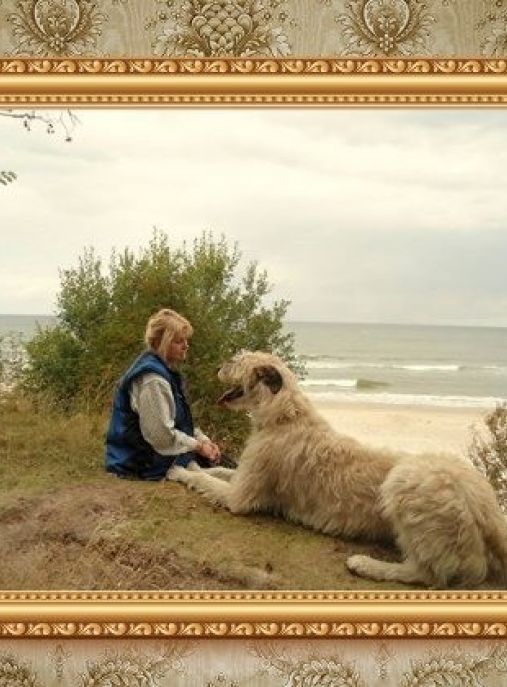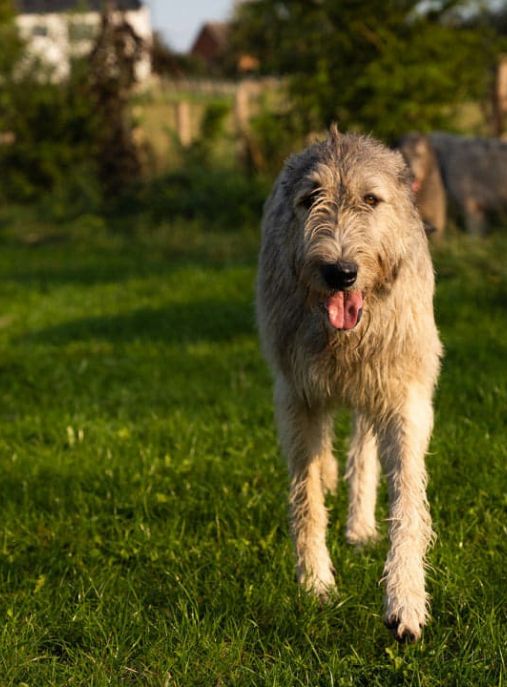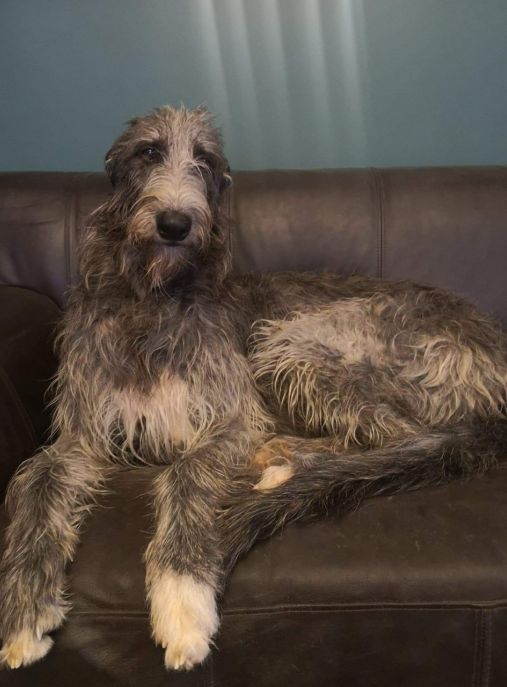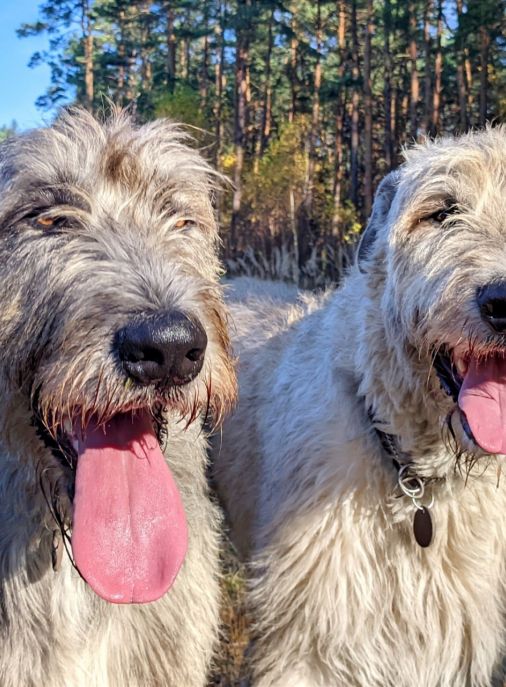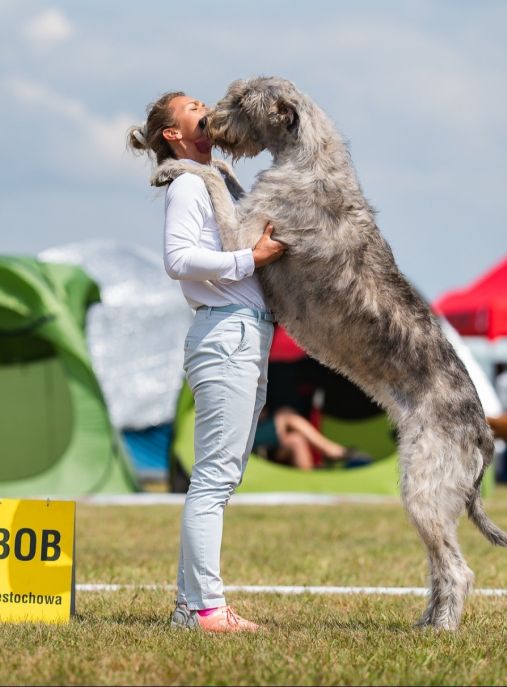The Irish Wolfhound, also known as the gentle giant, is a majestic and noble breed that captures the hearts of dog lovers worldwide. With its towering height, graceful appearance, and gentle nature, this breed has earned a special place in the hearts of many. In this text, we will delve into the extensive description of the Irish Wolfhound, exploring its history, characteristics, and interesting facts.
The Irish Wolfhound has a rich and ancient history that dates back thousands of years. Believed to have originated in Ireland, this breed was primarily bred for hunting and guarding purposes. They were highly valued for their ability to hunt wolves, boars, and even deer. The Irish Wolfhound's imposing size and strength made it a formidable opponent for these large game animals.
According to the FCI (Fédération Cynologique Internationale) typology, the Irish Wolfhound belongs to Group 10: Sighthounds. This group includes breeds that were originally developed for hunting by sight, relying on their exceptional vision and speed to track and capture prey. The Irish Wolfhound's keen eyesight and remarkable agility make it a perfect fit for this group.
The Irish Wolfhound is a breed that is suitable for a variety of individuals and families. Despite its large size, this breed is known for its gentle and friendly nature. They are excellent companions and are particularly good with children. Their calm and patient demeanor makes them ideal family pets, as they are tolerant of the antics and energy of young ones. However, due to their size, it is important to supervise interactions between Irish Wolfhounds and small children to prevent accidental injuries.
In terms of physical characteristics, the Irish Wolfhound is one of the tallest dog breeds in the world. Males typically stand at a minimum height of 32 inches (81 cm) at the shoulder, while females are slightly smaller, measuring at least 30 inches (76 cm). This breed is known for its lean and muscular build, with a deep chest and a long, powerful tail. Despite their size, Irish Wolfhounds are surprisingly agile and graceful in their movements.
When it comes to weight, Irish Wolfhounds are no lightweight. Males can weigh anywhere between 140 to 180 pounds (64 to 82 kg), while females generally range from 115 to 140 pounds (52 to 64 kg). Their large size and weight contribute to their impressive presence and commanding stature.
In terms of lifespan, the Irish Wolfhound has an average life expectancy of 6 to 8 years. While this may seem relatively short compared to smaller breeds, it is important to note that large dog breeds tend to have shorter lifespans. However, with proper care, nutrition, and regular veterinary check-ups, some Irish Wolfhounds have been known to live up to 10 years or more.
One interesting fact about the Irish Wolfhound is its gentle and affectionate nature. Despite its historical role as a hunting and guarding dog, this breed is known for its docile temperament and friendly disposition. They are generally good with other dogs and animals, making them suitable for multi-pet households. However, it is essential to socialize them from a young age to ensure they develop proper manners and behavior.
Another fascinating aspect of the Irish Wolfhound is its adaptability. Despite its origins as a hunting dog, this breed can thrive in various environments, including urban settings. While they do require regular exercise to maintain their physical and mental well-being, they are generally not as high-energy as some other breeds. A daily walk or moderate exercise session is usually sufficient to keep them content.
In conclusion, the Irish Wolfhound is a remarkable breed that combines strength, grace, and a gentle nature. With its towering height, it is hard to miss this majestic dog. Whether as a loyal family companion or a regal show dog, the Irish Wolfhound continues to capture the hearts of dog enthusiasts around the world.
The Irish Wolfhound, with its majestic appearance and gentle nature, is a breed that captures the hearts of dog lovers worldwide. Known as the gentle giants, these dogs possess a unique character that sets them apart from other breeds. In this text, we will delve into the character of Irish Wolfhounds, their behavior, and how to raise and train them.
First and foremost, Irish Wolfhounds are renowned for their calm and friendly disposition. Despite their imposing size, they are incredibly gentle and affectionate. They have an innate ability to sense emotions and are often seen providing comfort and solace to their owners. This makes them excellent therapy dogs and ideal companions for families, including those with children.
These dogs are known to be extremely loyal and devoted to their families. They form strong bonds with their owners and thrive on human companionship. Irish Wolfhounds are not suited for a solitary life in a backyard; they need to be an integral part of the family and be included in daily activities. They are happiest when they can spend quality time with their loved ones, whether it's going for walks, playing in the park, or simply lounging around the house.
Despite their gentle nature, Irish Wolfhounds possess a strong protective instinct. They are naturally watchful and will alert their owners to any potential danger. However, they are not aggressive by nature and are more likely to use their size and presence as a deterrent rather than resorting to aggression. Early socialization is crucial to ensure they develop into well-rounded dogs who can differentiate between genuine threats and harmless situations.
When it comes to training, Irish Wolfhounds are intelligent and eager to please. However, they can also be independent thinkers, which may require a patient and consistent approach. Positive reinforcement techniques, such as rewards and praise, work best with this breed. Harsh training methods or excessive force can be counterproductive and may damage the trust and bond between the dog and its owner.
Exercise is essential for Irish Wolfhounds to maintain their physical and mental well-being. Despite their large size, they are not overly energetic dogs and have a moderate exercise requirement. Daily walks, coupled with some off-leash time in a secure area, are usually sufficient to keep them content. However, it's important to avoid excessive exercise during their growth phase to prevent potential joint problems.
Grooming an Irish Wolfhound is relatively low maintenance. Their wiry, rough coat requires regular brushing to prevent matting and occasional hand-stripping to maintain its texture. Additionally, their nails should be trimmed regularly, and their ears checked for any signs of infection.
In conclusion, Irish Wolfhounds possess a character that is as remarkable as their appearance. Their gentle and friendly nature, combined with their loyalty and protective instincts, make them exceptional family pets. With proper socialization, training, and exercise, these gentle giants can thrive and bring joy to the lives of their owners.
The Irish Wolfhound is a majestic and gentle giant, known for its impressive size and noble appearance. Caring for an Irish Wolfhound requires special attention and understanding due to their unique needs. Here are some tips on how to properly care for these magnificent dogs, including what to do and what not to do.
1. Exercise: Irish Wolfhounds are active dogs that require regular exercise to maintain their physical and mental well-being. However, it's important to avoid excessive exercise during their growth phase to prevent joint and bone problems. Aim for moderate exercise, such as daily walks and occasional runs in a secure area.
2. Diet: Provide a balanced and nutritious diet to support the growth and overall health of your Irish Wolfhound. Consult with a veterinarian to determine the appropriate portion sizes and choose high-quality dog food that is specifically formulated for large breeds. Avoid overfeeding, as obesity can lead to various health issues.
3. Grooming: Irish Wolfhounds have a dense, wiry coat that requires regular grooming. Brush their coat at least once a week to remove loose hair and prevent matting. Additionally, check their ears regularly for signs of infection and clean them gently using a veterinarian-recommended solution. Trim their nails regularly and brush their teeth to maintain good oral hygiene.
4. Socialization: Early socialization is crucial for Irish Wolfhounds to ensure they grow up to be well-rounded and friendly dogs. Expose them to various people, animals, and environments from a young age. Enroll them in puppy classes or obedience training to help them develop good manners and proper behavior.
5. Health care: Regular veterinary check-ups are essential to monitor the overall health of your Irish Wolfhound. Vaccinations, parasite prevention, and dental care should be part of their routine healthcare. Additionally, be aware of breed-specific health issues such as heart problems, bloat, and hip dysplasia. Regular exercise, a balanced diet, and maintaining a healthy weight can help minimize these risks.
6. Living conditions: Irish Wolfhounds are generally adaptable and can live in various environments, including apartments. However, they require ample space to move around comfortably. A securely fenced yard is ideal to provide them with a safe area for exercise and play. Ensure that your home is free from hazards and provide a comfortable bed or resting area for them.
What NOT to do:
1. Do not leave your Irish Wolfhound alone for extended periods. They are social dogs and thrive on human companionship. Leaving them alone for too long can lead to separation anxiety and destructive behavior.
2. Avoid excessive jumping or strenuous exercise, especially during their growth phase. This can strain their developing bones and joints, leading to long-term health issues.
3. Do not ignore signs of discomfort or pain. Irish Wolfhounds are stoic by nature, and it may be challenging to detect when they are in pain. Regularly observe their behavior, and consult a veterinarian if you notice any changes or concerns.
4. Avoid overfeeding or feeding inappropriate food. Irish Wolfhounds are prone to obesity, which can exacerbate health problems. Stick to a balanced diet and consult your veterinarian for specific dietary recommendations.
5. Do not skip regular grooming sessions. Neglecting their coat can lead to matting, skin issues, and discomfort. Regular grooming not only keeps them looking their best but also helps maintain their overall health.
Caring for an Irish Wolfhound requires dedication, patience, and a deep understanding of their specific needs. By following these tips and providing them with love, proper care, and attention, you can ensure that your Irish Wolfhound lives a happy and healthy life.
The Irish Wolfhound, a majestic and noble breed, is known for its impressive size and gentle nature. When it comes to their coat color, these magnificent dogs exhibit a range of shades that add to their unique charm. While the breed standard recognizes several colors, one of the most common and iconic hues seen in Irish Wolfhounds is a stunning shade of gray.
The gray coat of an Irish Wolfhound is often described as a beautiful combination of various shades, creating a mesmerizing and distinguished appearance. It is a color that exudes elegance and sophistication, perfectly complementing the breed's regal stature. The gray can vary from a light, silvery tone to a deeper, charcoal-like shade, giving each individual dog a distinct and captivating look.
The base color of the Irish Wolfhound's coat is typically a medium to dark gray, resembling the color of storm clouds rolling across the sky. This primary hue is often enriched by subtle undertones, which can include hints of blue, silver, or even a touch of lavender. These undertones add depth and complexity to the overall color, enhancing the dog's visual appeal.
The texture of the Irish Wolfhound's gray coat is another noteworthy aspect. It is usually dense and wiry, providing protection against the harsh elements. This coarse texture gives the coat a rugged yet refined appearance, further accentuating the breed's robust and powerful presence.
As the Irish Wolfhound matures, its gray coat may undergo slight changes. Some dogs may develop a distinguished salt-and-pepper effect, with lighter and darker hairs intermingling to create a captivating pattern. This adds a touch of character and individuality to each dog, making them even more captivating and unique.
The gray coat of an Irish Wolfhound is not only visually striking but also serves a practical purpose. It helps the dog blend into its natural surroundings, especially in the Irish countryside where the breed originated. This camouflage-like coloration allowed them to stealthily approach their prey while hunting, showcasing the breed's exceptional adaptability and intelligence.
In conclusion, the common color of Irish Wolfhound dogs is a captivating shade of gray. This stunning hue, ranging from light silver to deep charcoal, is enriched by subtle undertones, giving each dog a unique and distinguished appearance. The coarse and wiry texture of their coat adds to their rugged yet refined charm. The gray coat not only enhances the breed's regal stature but also serves a practical purpose, allowing them to blend into their surroundings. Irish Wolfhounds truly embody the beauty and grace of the color gray, making them a sight to behold.
The Irish Wolfhound, known for its majestic appearance and gentle nature, is a breed that requires special attention to maintain its overall health and well-being. While they are generally a healthy breed, Irish Wolfhounds are prone to certain health issues that owners should be aware of. Additionally, proper care and preventive measures are essential to ensure the longevity and vitality of these magnificent dogs.
One of the most common health concerns in Irish Wolfhounds is their susceptibility to heart-related issues. Dilated cardiomyopathy (DCM) is a prevalent condition in this breed, characterized by the enlargement of the heart chambers, leading to decreased cardiac function. Regular veterinary check-ups, including cardiac evaluations, are crucial to detect and manage this condition early on. Medications, dietary changes, and exercise restrictions may be recommended by a veterinarian to support heart health.
Another health issue that affects Irish Wolfhounds is osteosarcoma, a type of bone cancer. This breed has a higher incidence of this disease compared to other breeds, and it often affects the long bones, such as the limbs. Early detection is vital for successful treatment, which may involve a combination of surgery, chemotherapy, and pain management. Regular orthopedic examinations and X-rays can aid in identifying any abnormalities or signs of bone cancer.
Gastric dilatation-volvulus (GDV), commonly known as bloat, is a life-threatening condition that can affect Irish Wolfhounds. It occurs when the stomach fills with gas and twists on itself, leading to a blockage of blood flow and potential organ damage. Symptoms include restlessness, unproductive retching, abdominal distension, and difficulty breathing. Immediate veterinary intervention is necessary to relieve the pressure and untwist the stomach. Preventive measures such as feeding multiple small meals, avoiding exercise immediately after meals, and using elevated food bowls can help reduce the risk of bloat.
Irish Wolfhounds are also prone to certain musculoskeletal issues, including hip dysplasia and elbow dysplasia. These conditions involve abnormal development of the hip or elbow joints, leading to pain, lameness, and reduced mobility. Regular exercise, a balanced diet, and maintaining a healthy weight can help minimize the risk and severity of these conditions. Additionally, genetic screening of breeding dogs can aid in reducing the incidence of dysplasia in future generations.
Proper nutrition is essential for the overall health of Irish Wolfhounds. A high-quality diet, specifically formulated for large and giant breeds, should be provided to support their growth, bone development, and overall well-being. It is important to monitor their weight to prevent obesity, which can exacerbate joint issues and put additional strain on their hearts.
Regular exercise is crucial for Irish Wolfhounds to maintain their physical and mental health. However, it is important to strike a balance between exercise and rest, as excessive activity can lead to stress on their joints and bones. Moderate exercise, such as daily walks and controlled play sessions, is recommended to keep them fit and stimulated.
Routine veterinary care, including vaccinations, parasite prevention, and dental care, is essential for Irish Wolfhounds. Regular check-ups allow for early detection of any health issues and ensure timely intervention. Additionally, maintaining good oral hygiene through regular brushing and professional dental cleanings can help prevent dental diseases, which are common in this breed.
In conclusion, while Irish Wolfhounds are generally healthy dogs, they are prone to certain health conditions that require careful monitoring and preventive measures. Regular veterinary check-ups, a balanced diet, appropriate exercise, and maintaining a healthy weight are essential for their well-being. With proper care and attention, Irish Wolfhounds can lead long, happy, and healthy lives as beloved companions.
The Irish Wolfhound is a majestic and noble breed known for its immense size and gentle nature. As a giant breed, proper nutrition plays a vital role in their overall health and well-being. Feeding an Irish Wolfhound requires careful consideration of their specific dietary needs to ensure they thrive and maintain a healthy weight.
One of the most important aspects of feeding an Irish Wolfhound is providing a balanced diet that meets their nutritional requirements. A high-quality commercial dog food formulated for large breeds is generally recommended. Look for a brand that lists a high-quality source of animal protein, such as chicken or lamb, as the first ingredient. Avoid foods that contain fillers, by-products, or artificial additives.
Protein is crucial for the development and maintenance of strong muscles in Irish Wolfhounds. Aim for a diet that provides around 25-30% protein content. Additionally, the diet should contain a moderate amount of fat, around 12-15%, to provide energy and support healthy skin and coat.
Irish Wolfhounds are prone to certain health issues, including bloat (gastric dilatation-volvulus), a life-threatening condition. To reduce the risk of bloat, it is recommended to feed them smaller, frequent meals rather than one large meal. Divide their daily food portion into two or three meals to prevent overeating and minimize the chances of gastric torsion.
While commercial dog food is a convenient option, it is essential to supplement it with fresh, whole foods. Incorporating fruits and vegetables into their diet can provide essential vitamins, minerals, and antioxidants. Some suitable options include carrots, green beans, sweet potatoes, and blueberries. However, avoid feeding them toxic foods like grapes, raisins, onions, garlic, and chocolate, as these can be harmful to dogs.
Irish Wolfhounds have a slower growth rate compared to smaller breeds, and rapid growth can lead to skeletal issues. It is crucial to feed them a diet specifically formulated for large breed puppies until they reach their full adult size, usually around 18-24 months. This ensures they receive the appropriate balance of nutrients to support healthy bone and joint development.
As with any dog, access to fresh, clean water is essential for an Irish Wolfhound's overall health. Make sure to provide them with a constant supply of water and clean their water bowl regularly.
Regular exercise is vital for Irish Wolfhounds to maintain a healthy weight and overall fitness. However, it is important to avoid excessive exercise, especially during their growth phase, as it can put strain on their developing bones and joints. Consult with a veterinarian to determine an appropriate exercise routine for your Irish Wolfhound based on their age, weight, and overall health.
In conclusion, feeding an Irish Wolfhound requires a balanced diet that meets their specific nutritional needs. Opt for high-quality commercial dog food formulated for large breeds, supplemented with fresh fruits and vegetables. Avoid toxic foods, feed smaller, frequent meals to prevent bloat, and ensure they have access to fresh water at all times. With proper nutrition and care, your Irish Wolfhound can lead a healthy and happy life.

